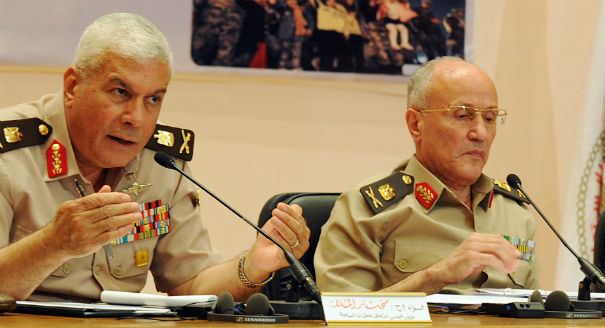In early 2014, Egypt’s Supreme Council of the Armed Forces (SCAF) announced that it would allow Abdel Fattah el-Sisi to run for president. This marked a new era in the military’s political role in Egypt. With the Muslim Brotherhood outlawed and other organized political actors in retreat, the military came to the forefront of the political arena to protect its economic interests. But these interests are the main roadblock to real and credible political change in Egypt.
In years past, the military institution had protected its economic assets and maintained de facto power without taking charge. But last year, in order to retain its economic rents, it took direct control of the state, and its involvement in the economy has since expanded through civil projects. These projects will deter the military from reducing its political involvement, leaving Egypt trapped in a system where the Egyptian military’s economic interests demand ever greater political control.
Though the military has played a role in the Egyptian economy since 1979, when U.S. aid money flowed in as a result of the peace treaty with Israel, Anwar Sadat ensured the military’s economic role then was apolitical. In the years since, the Egyptian military has leveraged its monopoly over large tracts of land and its supply of low-wage conscripts to develop successful enterprises. By the end of Mubarak’s tenure, the economic empire of the military institution had ballooned.
But the emergence during Mubarak’s last years in office of an economic elite that was affiliated with his son Gamal and the National Democratic Party posed a threat to the military’s economic and political power. State-owned enterprises were privatized at an unprecedented pace, and officers worried it was only a matter of time before military enterprises would be considered for sale. Businessmen with close ties to Gamal were gaining political power and were involved in shaping the political map. The 2011 revolution therefore presented an opportunity for the military institution to contain this challenge. During the transition period, the army made clear that its economic empire was not to be subject to debate in any new political order. In a blunt and direct statement, General Mahmoud Nasr, assistant defense minister for finance, said the military will “fight for its projects” which are the fruits of its own “sweat.” Top military officials also exerted their power to ensure that both constitutions that came out after 2011 included explicit clauses protecting the secrecy of the military institution’s financial accounts.
The military is simply no longer content to stay out of politics in exchange for certain economic privileges. Their old “rule but not govern” formula is increasingly being rejected in favor of a greater stake in politics that will safeguard economic rents. To guarantee this economic expansion, the army has appointed military-affiliated personnel to key government posts. Two days after the military overthrow of Mohammed Morsi on July 3, 2013, for instance, Sisi’s mentor Mohamed Farid el-Tohamy was selected as head of the General Intelligence Directorate. A few days before the violent dispersal of the Rabaa sit-in, the army backed the appointment of governors who were mostly retired military generals. Last month, Khaled Abdel-Sallam al-Sadr, another retired general, was appointed as secretary-general of parliament, a position that runs the legislative body’s daily operation and manages which laws will be debated.
Also within a short period after the July 3 military takeover, the army-backed government issued an executive decree expanding ministers’ powers to sign contracts without competitive bidding. Infrastructure projects, including those covered by a $4.9 billion stimulus package mostly funded by the UAE, were thus earmarked to military-affiliated enterprises. More recently, the military signed a multi-billion dollar housing project with Arabtec, a major Emirati real estate firm, and there are rumors that shares in Vodafone Egypt held by the state-owned Egypt Telecom will be sold out to “sovereign bodies,” a term used to refer to military intelligence. Of all the new initiatives, however, the most significant is the Suez Canal area development project, which includes excavating a parallel canal and building several industrial zones and logistics centers alongside it. This project is under the supervision and management of the Army Corps of Engineers and the Suez Canal Authority, which is headed by a retired SCAF member.
However, given Egypt’s myriad economic challenges, the military might need to allow a greater role for other economic players to grow, whether in the form of private sector firms or cooperatives. The state is no longer capable of absorbing the large pool of unemployed youth, and employment in the informal sector of the economy exacerbates social and economic inequality. This could threaten the influence of the military’s economic empire. The rational strategy would therefore entail tolerating the emergence of other political forces associated with private enterprise, rather than bearing the political cost of a stagnant economy and growing youth unemployment. Otherwise, if the state and its military core fail to restore political stability and re-establish economic security, it could lose its grip on power.
Regardless of the outcome, the military’s expansion of its economic activities has not faced any serious opposition (unlike its heavy hand in politics), including from secular political parties that called for a civil state during Morsi’s year in office. On the contrary, the military’s economic role, especially in infrastructure, has been lauded as rescuing an ailing economy and failing state. But the rise of a viable and organized political power requires a wider political space and a longer time span, both of which are absent in the near future. Ultimately, a political system that does not include military involvement would require curbing its economic empire.
Samer Atallah is an assistant professor of economics at the American University in Cairo.
Correction: An earlier version of this article stated that shares of Egypt Telecom will be sold to sovereign bodies, rather than the shares the company owns in Vodafone Egypt.


.jpg)


